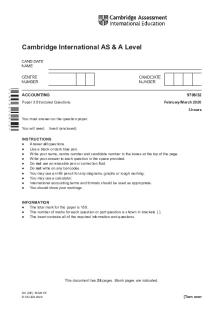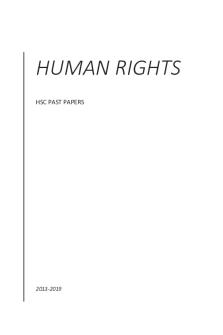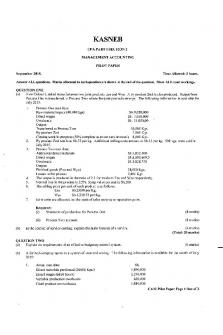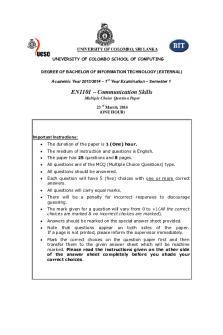L3U7 QP Jan 19 Final PDF - Past papers for 2019 with answers PDF

| Title | L3U7 QP Jan 19 Final PDF - Past papers for 2019 with answers |
|---|---|
| Author | Nia Patel |
| Course | Contract law and tort law |
| Institution | The Open University |
| Pages | 12 |
| File Size | 158.7 KB |
| File Type | |
| Total Downloads | 63 |
| Total Views | 121 |
Summary
Past papers for 2019 with answers...
Description
16 January 2019 Level 3 FAMILY LAW Subject Code L3-7
THE CHARTERED INSTITUTE OF LEGAL EXECUTIVES UNIT 7 – FAMILY LAW*
Time allowed: 1 hour and 30 minutes plus 15 minutes ’ reading time
Instructions to Candidates ▪
You have FIFTEEN minutes to read through this question paper before the start of the examination.
▪
It is strongly recommended that you use the reading time to read this question paper fully. However, you may make notes on this question paper or in your answer booklet during this time, if you wish.
▪
This question paper is divided into TWO sections. You must answer ALL the questions from Section A. There are three scenarios in Section B. You must answer the questions relating to ONE of the scenarios from Section B ONLY.
▪
Write in full sentences – a yes or no answer will earn no marks.
▪
Candidates must comply with the CILEx Examination Regulations.
▪
Full reasoning must be shown in answers. Statutory authorities, decided cases and examples should be used where appropriate.
Information for Candidates ▪
The mark allocation for each question and part-question is given and you are advised to take this into account in planning your work.
▪
Write in blue or black ink or ballpoint pen.
▪
Attention should be paid to clear, neat handwriting and tidy alterations.
▪
Complete all rough work in your answer booklet. Cross through any work you do not want marked.
Do not turn over this page until instructed by the Invigilator.
* This unit is a component of the CILEx LEVEL 3 PROFESSIONAL QUALIFICATIONS and LEVEL 3 LEGAL SERVICES KNOWLEDGE QUALIFICATIONS Page 1 of 12
BLANK PAGE
Page 2 of 12
SECTION A (Answer ALL questions in Section A)
1.
Explain the legal basis on which a civil partnership can be dissolved. (3 marks)
2.
State one case-law definition of marriage and explain its relevance today. (2 marks)
3.
Explain the provisions in s.14 and s.15 Trusts of Land and Appointment of Trustees Act 1996. (3 marks)
4.
(a)
Outline the relevance for family law of each of the following statutes: (i)
Gender Recognition Act 2004;
(ii)
Crime and Courts Act 2013.
(1 mark) (1 mark) (b)
5.
Identify the statute under which a same-sex married couple would pursue a divorce. (1 mark) (Total: 3 marks)
Define ‘parental responsibility’. (2 marks)
6.
Explain the purpose of the ‘welfare checklist’ in the Children Act 1989 and identify three elements from the checklist. (4 marks)
7.
Explain how the Human Rights Act 1998 can assist a father who makes an application for a Child Arrangements Order under s.8 Children Act 1989 to have contact with his children. (3 marks)
8.
Explain the significance of the case of Radmacher v Granatino (2010). (3 marks)
9.
Describe an order for judicial separation and how it compares to an order for divorce. (4 marks)
10. Explain the significance of the judgment in Hirani v Hirani (1983). (3 marks)
(Total Marks for Section A: 30 marks)
Turn over Page 3 of 12
SECTION B (There are three scenarios in Section B. Answer the questions relating to ONE of the scenarios ONLY) Scenario 1 Nicola and Bridget became civil partners in 2010. Nicola is 45 years old and Bridget is 58 years old. They cohabited for five years, before they registered their civil partnership. In 2012, they adopted a girl named Sian, who is now 11 years old. They agreed at the time of the adoption that Bridget would have the main care of Sian. Nicola is a social worker and earns £45,000 per annum, and Bridget is a parttime charity worker. Bridget earns approximately £12,000 per annum. They live in a three-bedroomed house near Manchester. The house is worth £180,000 and there is an outstanding mortgage on the property of £45,000. The house was put in joint names in 2010, but Nicola owned the house for 10 years prior to this. Nicola has a local authority pension, into which she has been paying since she was 24 years old. Bridget has no pension. Six months ago, Bridget discovered text messages suggesting that Nicola was having a relationship with someone named Alex. Prior to this, Bridget had already noticed a change in their relationship. Nicola seemed angry and unhappy, often citing Bridget’s age as the reason. As a consequence, Nicola began to spend more and more time away from home. Bridget suspected that Nicola was lying when she claimed to be working late, but Nicola refused to discuss these suspicions. Bridget felt hurt and angry when Nicola made comments about Bridget ‘getting old’, and the tension in the home was hard for Bridget to live with. It was also beginning to have a negative effect on Sian. Two weeks ago, Nicola left the family home. She has demanded that Sian come to live with her, claiming to be the ‘better parent’ due to her younger age. Sian wants to remain living with Bridget in the family home and refuses to see or talk to Nicola.
Page 4 of 12
Scenario 1 Questions 1.
Advise Bridget whether she can end her civil partnership and, if so, on what basis. Your answer must include reference to legislation and case law. (7 marks)
2.
(a)
Identify and explain four relevant financial and property orders that Bridget can apply for, if she pursues a dissolution order. (9 marks)
(b) Apply four relevant factors that the court will consider in addressing Bridget’s application. (8 marks) (Total: 17 marks) 3.
(a)
Advise Bridget what order she can apply for so that Sian can remain living with her, and on what basis she can apply. (2 marks)
(b)
Explain the main principles in s.1 Children Act 1989 in the context of Bridget’s application for Sian to live with her. (4 marks) (Total: 6 marks)
(Total Marks for Scenario 1: 30 marks)
Turn over Page 5 of 12
Scenario 2 Ruth and Daniel have been married for 12 years and have three children: Levi, 11 years old; Esther, 7 years old; and Isaac, 5 years old. Ruth was 18 years old when she married, and Daniel was 30 years old. Ruth and Daniel’s marriage was arranged by their parents. Ruth was vehemently opposed to getting married so young, and because she barely knew Daniel. Her dream all through school had been to go to university and train to be a doctor. She reluctantly agreed to go ahead with the marriage, because she knew that if she did not agree, she would be forced to leave home without support, as had happened to a friend of hers. Immediately after the marriage took place, Daniel announced that Ruth would not be allowed to go to university and that she would have to give up her career ambitions. Daniel believes that Ruth’s duty is to care for the home and to provide full-time care for him and their children. In the face of continued opposition from Daniel and members of both his family and her own, Ruth has now decided reluctantly to leave the family home. She has been diagnosed with depression due to living under Daniel’s control. She knows that Daniel will fight to prevent the children from moving out with her, but she is desperate to maintain a relationship with them. Daniel has told her that if she leaves home, she will have no further contact with the children. Levi has told Daniel that he does not want anything more to do with his mother if she leaves the family home, but Ruth is unsure whether he actually means this. When asked whether she wishes to divorce Daniel, Ruth is reluctant, as she still considers herself devoutly religious and does not feel that divorce is a viable option. She maintains hope that Daniel will come round to understanding that her education and working as a doctor will be to the whole family’s advantage. She is desperately sad to leave the children, but feels that her life with Daniel is impossible and cannot continue.
Page 6 of 12
Scenario 2 Questions 1.
Advise Ruth whether her marriage to Daniel is valid and the practical effects of this. (8 marks)
2.
Explain to Ruth what other legal option is available to her, if she does not wish to pursue an application for nullity or divorce, and what effect this will have for her and Daniel. (9 marks)
3.
Explain to Ruth what order she can apply for with regard to the children, and how the court will approach her application. (9 marks)
4.
If Levi objects to having contact with Ruth, explain how the court will approach his objection. (4 marks)
(Total Marks for Scenario 2: 30 marks)
Turn over Page 7 of 12
Scenario 3 Mei Ling and Rob have lived together for three years and have never married. They live in a two-bedroomed terraced house, which is in Rob’s sole name. Rob bought the house 10 years ago with money he received after his father died. The house has a small mortgage. Mei Ling and Rob have a son named Jiang, who is 6 years old. Rob is not named as the father on Jiang’s birth certificate, as Mei Ling and Rob had temporarily separated before Jiang was born. Mei Ling and Rob’s relationship has been ‘on and off’ since Jiang was born, due to Rob’s drinking and recreational drug use. In spite of this, they have remained friends and, three years ago, Rob asked Mei Ling to move in with him. When she moved in, Mei Ling quit her job as a care home assistant. Since then, she has undertaken casual jobs as and when she can find a friend or family member to look after Jiang. Whatever she earns goes into a joint bank account, from which the household bills and mortgage are paid. Rob works as a builder, but his work is not regular. Mei Ling and Rob are struggling to meet expenses and have built up substantial debts. Their relationship has broken down due partly to the financial stress and also due to Rob’s treatment of Mei Ling, which is controlling and threatening. As a result, Mei Ling and Jiang have gone to stay at a friend’s house. Rob has sent Mei Ling texts, telling her that she has no rights to any of his property or money. Mei Ling’s friend says this is wrong, and that because of the length of their relationship she is legally entitled to Rob’s financial support and can apply to court for financial orders. The friend also tells Mei Ling that she is entitled to stay in Rob’s house with Jiang. Mei Ling is confused, stressed and suffering anxiety, and she needs support.
Page 8 of 12
Scenario 3 Questions 1.
Advise Mei Ling whether she has any rights in relation to Rob’s house and explain how she could realise those rights. (10 marks)
2.
(a)
Explain the nature of Mei Ling and Rob’s legal status with regard to Jiang, and how this will affect any applications that either of them makes regarding Jiang. (6 marks)
(b)
Explain to Rob how he can acquire parental responsibility for Jiang. (4 marks) (Total: 10 marks)
3.
Advise Mei Ling whether her friend’s advice is correct and whether she can legally apply for financial support from Rob. (7 marks)
4.
Explain what order the court could make to provide non-financial support for Mei Ling and Jiang. (3 marks)
(Total Marks for Scenario 3: 30 marks)
End of Examination Paper © 2019 The Chartered Institute of Legal Executives Page 9 of 12
BLANK PAGE
Page 10 of 12
BLANK PAGE
Page 11 of 12
BLANK PAGE
Page 12 of 12...
Similar Free PDFs

Jan 2019 N1589 - Past paper
- 2 Pages

Past Papers for Social Studies
- 25 Pages

CSS past papers for islamiat
- 25 Pages

CPC - QP - Exam Question Papers
- 6 Pages

9706 past papers
- 28 Pages

Past exams papers 2
- 10 Pages

Past Papers Human Rights
- 14 Pages

AC100 - Past exam papers
- 15 Pages

Management Accounting Past Papers
- 38 Pages

CRIMINAL LAW PAST PAPERS
- 4 Pages
Popular Institutions
- Tinajero National High School - Annex
- Politeknik Caltex Riau
- Yokohama City University
- SGT University
- University of Al-Qadisiyah
- Divine Word College of Vigan
- Techniek College Rotterdam
- Universidade de Santiago
- Universiti Teknologi MARA Cawangan Johor Kampus Pasir Gudang
- Poltekkes Kemenkes Yogyakarta
- Baguio City National High School
- Colegio san marcos
- preparatoria uno
- Centro de Bachillerato Tecnológico Industrial y de Servicios No. 107
- Dalian Maritime University
- Quang Trung Secondary School
- Colegio Tecnológico en Informática
- Corporación Regional de Educación Superior
- Grupo CEDVA
- Dar Al Uloom University
- Centro de Estudios Preuniversitarios de la Universidad Nacional de Ingeniería
- 上智大学
- Aakash International School, Nuna Majara
- San Felipe Neri Catholic School
- Kang Chiao International School - New Taipei City
- Misamis Occidental National High School
- Institución Educativa Escuela Normal Juan Ladrilleros
- Kolehiyo ng Pantukan
- Batanes State College
- Instituto Continental
- Sekolah Menengah Kejuruan Kesehatan Kaltara (Tarakan)
- Colegio de La Inmaculada Concepcion - Cebu





